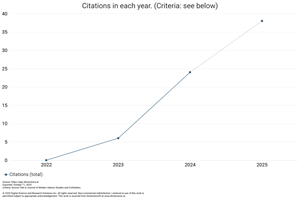Challenges of Majelis Da'wah in Strengthening Santri Culture at Islamic Boarding Schools
DOI:
https://doi.org/10.59653/jmisc.v1i01.4Keywords:
halaqah, character, religious, honestAbstract
This study aims to describe the opportunities and challenges of implementing halaqah da'wah in building the religious and honest character of the santri. This type of research is descriptive qualitative research with the main data source being students as informants, murabbi as key informants and the chairman of the foundation as extend informant. Documents, journals, and books become secondary data. Collecting data with in-depth interview techniques, observation and documentation. Data analysis techniques were carried out by meducing data, presenting and drawing conclusions. What was obtained from this study showed that the opportunities and challenges were not only felt by the students, the murabbi and the Islamic boarding school also felt them. Santri have the opportunity to add additional insight related to adab and religious aqeedah. On the other hand, challenges in the form of feeling tired and drowsy after will activities reduce their concentration in carrying out Da'wah halaqah. The results of this study become a reference for Islamic boarding schools in managing schedules for efficient implementation of halaqah Da'wah. Integrating Islamic values through preaching halaqah is an alternative solution to learning models in public schools so that the values of the younger generation are not distracted by the times.
Downloads
References
Afista, Y., & Abu Bakar, M. Y. (2021). Islamic Boarding School-Based Madrasah: Policy Efforts to Reform the Superior Education Model. Al-Hayat: Journal of Islamic Education, 4(2). https://doi.org/10.35723/ajie.v4i2.144
Hamidah, K., & Chasannudin, A. (2021). Mechanization of Islamic moderation da’wah in the Nahdlatul Ulama pesantren tradition. Jurnal Ilmu Dakwah, 41(1). https://doi.org/10.21580/jid.v41.1.7134
Ihsan, & Fatah, A. (2021). Pancasila and islamic education: The deradicalization model of madrasahs based on islamic boarding schools in central java. In Qudus International Journal of Islamic Studies (Vol. 9, Issue 1, pp. 245–278). STAIN Kudus. https://doi.org/10.21043/QIJIS.V9I1.8941
Ismail, I., Tahlil, T., Nurussalam, N., & Kesuma, Z. M. (2020). The application of social marketing to change smoking behavior of students in traditional islamic boarding schools in aceh. Open Access Macedonian Journal of Medical Sciences, 8, 606–610. https://doi.org/10.3889/oamjms.2020.5117
Jaafar, N. (2019). The effect of self efficacy on islamic education teachers’ quality in malaysia secondary school. Asia Pacific Journal of Educators and Education, 34. https://doi.org/10.21315/apjee2019.34.4
Laeheem, K. (2020). Domestic violence among married Thai muslim couples in satun province: Solutions from muslim leaders’ perspectives. In Pertanika Journal of Social Sciences and Humanities (Vol. 28, Issue 3).
Laeheem, K., Tepsing, P., Na Sakolnakorn, T. P., & Azizskul, H. (2020). Action Research to Promote Islamic Learning for Elderly Muslims in Khao Tum Sub-District and Yarang Sub-District Yarang District Pattani Province. The Journal of Social Sciences Research, 66. https://doi.org/10.32861/jssr.66.639.648
Latif, M., & Hafid, E. (2021). multicultural attitudes in an Islamic boarding school of South Sulawesi–Indonesia. Cogent Education, 8(1). https://doi.org/10.1080/2331186X.2021.1968736
Maharani, S. D., MS, Z., & Nadiroh, N. (2019). Transformation of The Value of Religious Characters in Civic Education Learning in Elementary Schools. International Journal of Multicultural and Multireligious Understanding, 6(2), 295. https://doi.org/10.18415/ijmmu.v6i2.683
Mustaqim, M. R., Maghfiroh, M., & Nurhaedha, H. (2020). Management of Halaqah Tahfidz al-Qur’an in Darut Taqwa Ponorogo Islamic Boarding School. Jurnal Tarbiyatuna, 11(2), 128–142. https://doi.org/10.31603/tarbiyatuna.v11i2.3040
Sangadah, L., & Ismail, S. (2020). Implementation of Five Calls Reminder (FCR) as the Adaptive Muroja’ah (Memorization) Method for the Qur’an at Daarunnajah Magelang Islamic Boarding School. Jurnal Pendidikan Islam, 9(2). https://doi.org/10.14421/jpi.2020.92.173-194
Setyaningsih, R. (2023). The Phenomenon of E-Dakwah in the New Normal Era: Digital Literacy of Virtual Da’i in Da’wah Activities. International Journal of Islamic Thought and Humanities, 2(1 SE-Articles), 65–75. https://doi.org/10.54298/ijith.v2i1.60
Sodikin, O., Barlian, U. C., Sauri, S., & Nurulhaq, D. (2020). Management of Character Education Based on Panca Jiwa in Pondok Pesantren Darul Muttaqien Bogor. International Journal of Nusantara Islam, 8(2). https://doi.org/10.15575/ijni.v8i2.10776
Downloads
Published
How to Cite
Issue
Section
License
Copyright (c) 2023 Ali Jauhari

This work is licensed under a Creative Commons Attribution-ShareAlike 4.0 International License.
Authors who publish with this journal agree to the following terms:
- Authors retain copyright and grant the journal right of first publication with the work simultaneously licensed under a Creative Commons Attribution-ShareAlike that allows others to share the work with an acknowledgement of the work's authorship and initial publication in this journal.
- Authors are able to enter into separate, additional contractual arrangements for the non-exclusive distribution of the journal's published version of the work (e.g., post it to an institutional repository or publish it in a book), with an acknowledgement of its initial publication in this journal.
- Authors are permitted and encouraged to post their work online (e.g., in institutional repositories or on their website) prior to and during the submission process, as it can lead to productive exchanges, as well as earlier and greater citation of published work (See The Effect of Open Access).
























